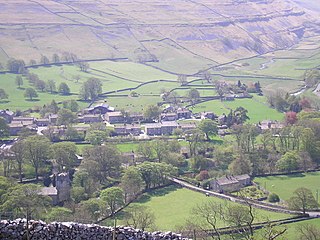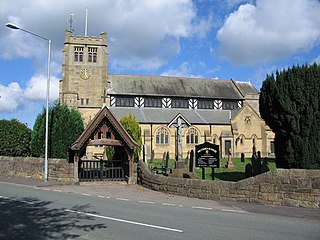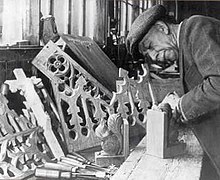
The River Wharfe is a river in Yorkshire, England originating within the Yorkshire Dales National Park. For much of its middle course it is the county boundary between West Yorkshire and North Yorkshire. Its valley is known as Wharfedale.

Arncliffe is a small village and civil parish in Littondale, one of the Yorkshire Dales in England. Littondale is a small valley beside Upper Wharfedale, 3 miles (4.8 km) beyond Kilnsey and its famous crag. It is part of the Craven district of the non-metropolitan county of North Yorkshire, but is in the historic West Riding of Yorkshire. The population of the civil parish was estimated at 80 in 2015.

Kettlewell is a village in Upper Wharfedale, North Yorkshire, England. Historically part of the West Riding of Yorkshire, it lies 6 miles (10 km) north of Grassington, at the point where Wharfedale is joined by a minor road which leads north-east from the village over Park Rash Pass to Coverdale. Great Whernside rises to the east. The population of the civil parish was 322 at the 2011 census, with an estimated population of 340 in 2015. The population was recorded as being at 321 according to the United Kingdom 2021 census.

Grassington is a village and civil parish in North Yorkshire, England. The population of the parish at the 2011 Census was 1,126. Historically part of the West Riding of Yorkshire, and now in the lieutenancy area of North Yorkshire, the village is situated in Wharfedale, about 8 miles (10 km) north-west from Bolton Abbey, and is surrounded by limestone scenery. Nearby villages include Linton, Threshfield, Hebden, Conistone and Kilnsey.

Kilburn is a village in the civil parish of Kilburn High and Low, in the Hambleton District in the county of North Yorkshire, England. It lies on the edge of the North York Moors National Park, and 6.2 miles (10 km) north of Easingwold.
Greenhow is a village in North Yorkshire, England, often referred to as Greenhow Hill. The term how derives from the Old Norse word haugr meaning a hill and a mound, so Greenhow literally means 'Green's hill or mound'.

Buckden is a village and civil parish in the Craven district of North Yorkshire, England. Historically part of the West Riding of Yorkshire, Buckden is situated in the Yorkshire Dales National Park, and on the east bank of the River Wharfe in Wharfedale. The civil parish includes the hamlet of Cray and the whole of Langstrothdale. According to the 2011 Census the parish had a population of 187.

Burnsall is a village and civil parish in the Craven district of North Yorkshire, England. It is situated on the River Wharfe in Wharfedale, and is in the Yorkshire Dales National Park.

The Diocese of Middlesbrough is a Latin diocese of the Catholic Church based in Middlesbrough, England and is part of the province of Liverpool. It was founded on 20 December 1878, with the splitting of the Diocese of Beverley which had covered all of Yorkshire. The Bishop's See is in Coulby Newham, Middlesbrough, at St Mary's Cathedral. Catholic schools in the diocese are run by the Nicholas Postgate Catholic Academy Trust as well as St Cuthbert's Roman Catholic Academy Trust.

Hubberholme is an old village in Upper Wharfedale in the Yorkshire Dales, North Yorkshire, England, at the point where Langstrothdale meets Wharfedale. It is quite secluded and the nearest village is Buckden.

St Mary Magdalene is a Church of England parish church in the town of Yarm, in the Borough of Stockton-on-Tees, North Yorkshire, England, which is dedicated to Jesus' companion Mary Magdalene. Administratively, it is a parish of the Diocese of York. The current rector is the Reverend Darren Moore.

The Adare Friary, located in Adare, County Limerick, Ireland, formerly known as the "Black Abbey", is an Augustinian Friary founded in 1316 by the Earl of Kildare. It is now known as "St. Nicholas' Church of Ireland" parish church, and St Nicholas' National School. It is a nationally ranked building in the NIAH register.

St Michael's Church is the Church of England parish church of Shotwick, Cheshire, England. It a Grade I listed building. It has a Norman doorway but most of the church is Gothic. Its furniture includes some ancient items. In the churchyard are several structures that are Grade II listed. The church is an active parish church in the Diocese of Chester, the archdeaconry of Chester and the deanery of Wirral South. Its benefice is combined with that of St Nicholas, Burton.

Ampleforth Abbey is a monastery of Benedictine monks a mile to the east of Ampleforth, North Yorkshire, England, part of the English Benedictine Congregation. It descends from the pre-Reformation community at Westminster Abbey through the last surviving monk from Westminster, Sigebert Buckley. As of 2024 the monastery has 41 monks, and sometimes will have 50 nuns of the monastery organization.

St Matthew's Church, is in the town of Buckley, Flintshire, Wales. It is an active Anglican parish church in the Borderlands Mission Area, the archdeaconry of Wrexham and the diocese of St Asaph. The church is a Grade II* listed building.

St Beuno's Church, Penmorfa, is a redundant church near the settlement of Penmorfa, some 2 miles (3 km) to the northwest of Porthmadog, Gwynedd, Wales. It is designated by Cadw as a Grade II* listed building, and is under the care of the Friends of Friendless Churches.
John Joseph Bunting was a British sculptor and teacher. He was influenced by furniture-maker Robert (Mouseman) Thompson in nearby Kilburn, North Yorkshire, and after Oxford University and a period of National Service, he returned to Yorkshire as Thompson's wood shop apprentice in 1948.

St Michael and All Angels is a parish church in the Church of England in Hubberholme, North Yorkshire. It is a Grade II* listed building. The church, and the neighbouring George Inn, were favourite locations of the author J. B. Priestley, whose ashes are buried in the churchyard.

Our Lady and St Benedict's Church is a Catholic parish church in Ampleforth, a village in North Yorkshire, in England.

























